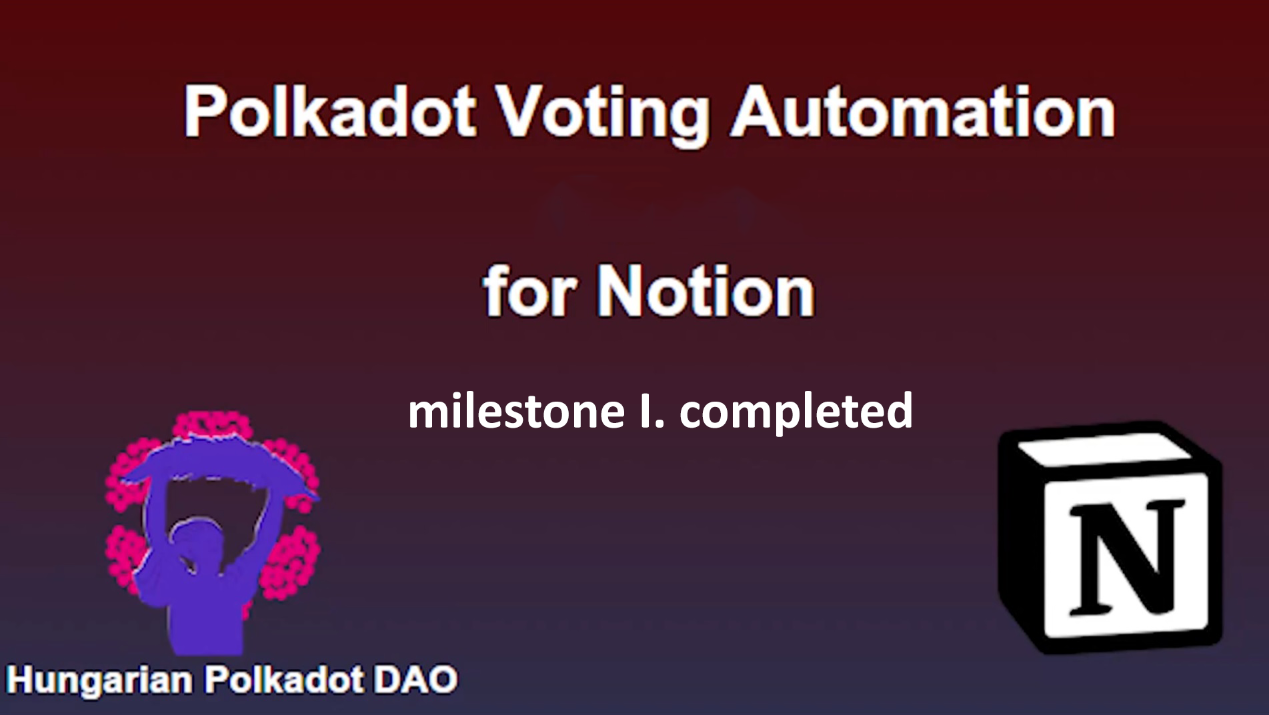We’re excited to share some great news from the Hungarian Polkadot DAO, we have officially completed Milestone 1 of our project under the Open Source Developer Grants Bounty Program!
This journey started with a simple question:
“How can we make it easier for small DAOs (like ourselves) to make governance decisions without wasting time and money?”
The answer became our Notion-based Voting Tool, which is a lightweight, cost-effective, and trust-minimised way for DAOs to manage Polkadot OpenGov proposals, come to consensus and vote together.
Why We Built It
If you’ve ever been part of a small DAO, you know the struggle:
- hunting down proposal statuses across platforms,
- manually updating vote results,
- spending way too much money on multisig transaction voting fees,
- having conversations scattered across different platforms.
We wanted to keep the collaboration in one place (Notion), connect it directly to Polkadot OpenGov data, and dedicate more time to discussing the proposals instead of spending hours on administrative tasks and casting votes.
✅What Milestone 1 Delivered
With the support of the Open Source Developer Grants Bounty Program, we’ve now built and tested a tool that:
- fetches proposals from Polkassembly into a Notion template automatically,
- tracks proposal details like track, reward amount, content, and status,
- updates votes in Notion once they’re cast, with status, date, and extrinsic link,
- executes batch votes via Mimir which allows multiple votes to be batched into one transaction instead of multiple ones,
- keeps it trustless by voting from a proxy wallet controlled by the DAO’s multisig, which means the multisig members have the final say in every transaction and nobody can override this mechanic,
- runs open source so any DAO can set it up with our guide and modify it (GitHub link here).
✅Milestone 1 Deliverables
0a. License — GPLv3
- The repository is released under GNU GPL v3.0, ensuring the tool remains open and forkable by the community.
0b. Documentation — Code & Starter Guide
- Inline JSDoc across the TypeScript codebase.
- A basic tutorial covers setup (Notion template, API key, .env), running locally, and the Docker setup explanation is also part of the guide.
0c. Testing & Testing Guide — Unit + Integration
- Core functions are covered by unit tests; integration tests validate external APIs (Notion, Polkassembly).
- How to run:
bash
npm test
0d. Docker — Containerized App
- Provided Dockerfile and docker-compose.yml to test and run all functionality in containers.
- Quick start:
bash
cp env.example .env
docker-compose up --build
curl http://localhost:3000/health
- Production-ready notes include restart policies, logging, and environment overrides.
0e. Article — Grant Milestone Summary
- This article announces Milestone 1 completion under the Open Source Developer Grants Bounty Program.
1. Express Backend — Proposal Fetching to Notion
- An Express app pulls OpenGov referenda from Polkassembly, normalizes fields (track, reward amount, links, content, status), and inserts/updates entries in the Notion database.
- Includes manual refresh endpoint:
- GET /refresh-referendas?limit=30
- GET /refresh-referendas?limit=30
2. Mimir Integration — Batch Voting
- The backend integrates with Mimir to prepare and batch votes from a proxy controlled by your DAO multisig.
- Mark proposals “Ready to Vote” in Notion → visit GET /send-to-mimir → restore & sign batched transactions in Mimir.
- Cuts weekly voting time from ~20 minutes to ~1–2 minutes and fees from ~$10 to about $1.
Already in Use
We first showcased the tool at our Central European Polkadot gathering in Warsaw in March 2025, where seven regional communities got a live demo.
One of them, Bohemia Fam (Czechish DAO), has already adopted it and is using it regularly.
We’ve also been using it ourselves since September 2024, including during the Decentralized Voices Program for Cohorts 3 & 4, and it saved us countless hours and fees. On average we are voting on 10-15 proposals each week and just to start these transaction we would be spending 20+ minutes each week to initiate these and roughly $10 per week in transaction fees. Which is now using the tool is less than 1 minute, and around $1 per week using our tool.
What’s Next
We’re already thinking about the next big steps:
- one-click setup using only a Notion API key,
- browser extension to annotate and discuss proposals directly on Polkassembly.
Want to Try It?
Following this guide will get you going in a few minutes.
Huge thanks to the Open Source Developer Grants Bounty Program for funding this work, the Mimir team for their batching tool, and everyone in the community who has tested and gave us feedback.
Let’s keep making governance easier, faster, and more fun from small local DAOs to the biggest on-chain collectives.

